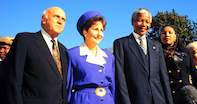
Rise of a New Era
It was difficult to read Nelson Mandela’s thoughts. He was a warm and courteous host at the lunch party at his official residence, Mahlamba 'Ndlopfu (Rise of a New Era), the former Libertas, which all the wives of the Prime Ministers and Presidents had occupied at one time. He also invited the wives and widows of the leaders of the liberation movements, among them former African National Congress President Oliver Tambo's widow, Adelaide, and Albertina Sisulu, wife of former ANC vice-president Walter Sisulu.
The two groups, the White Nationalists and the black and white wives and widows of the liberation leaders, had never met before. They were sitting in separate groups when President Mandela strode in with the cheerful greeting, "Here are the famous ladies". Then there were hugs for Elise Botha, wife of the former President Pieter W Botha, and Magda Diederichs, widow of former President Nico Diederichs.
In no time he had both groups mingling together, while he exchanged pleasantries and light-hearted banter with them all. There was no suggestion that he was playing out a role. Not for him the tasteless remarks of Vorster after he had publicly entertained the former Malawian President Hastings Banda and his "official hostess" Cecilia Kadzamira, to a state banquet in Johannesburg.
A defensive Vorster had explained to his Nationalist followers that he had sat next to the black woman at the function "as a patriotic duty in the interests of South Africa".
Forgive, But Not Forget!
The reason President Mandela gave for entertaining the women — and it was his own idea — was a challenge to the country. He said it was "a practical way of forgetting the past" and, of course, another of his determined efforts to effect reconciliation among all South Africans. His statement, in the light of his strong support for the Truth and Reconciliation Commission which was set up to focus a powerful searchlight on the infamy of the apartheid days and a part of the post-apartheid period, appeared to be ambiguous.
But it was apparent he was focussing on the attitudes and prejudices that people had once adopted so readily and the fears generated by apartheid policies. He wanted Afrikaner hardliners in the Conservative and Nationalist Parties and in militant organisations such as the Afrikaner Weerstandsbeweging (the ultra Right Wing Afrikaner Resistance Movement with its neo-Nazi symbols) to be aware that they have nothing to fear from the new democracy and that South Africa can overcome its racism and face the future as one nation.
But he was not allowed to confuse reconciliation and the work of the Truth Commission. Mrs Ntsiki Biko, widow of the activist Steve Biko who was tortured and killed by Security Police during interrogation, would not let him. She said, "We can forgive, yes, but not forget!"
Reconciliation Among All South Africans
And the parties were successful. The women at the lunch were charmed by him, as was Mrs Verwoerd. President Mandela was working very hard on reconciliation. Having been largely instrumental in bringing about a quite extraordinary negotiated revolution and settlement with the Afrikaner National Party, he has striven to placate blacks disillusioned over lack of progress in the Reconstruction and Development Programme and other social upliftment plans.
He also calmed the fears of whites, especially the right-wingers, many of whom barricaded themselves in their homes with their guns at the ready at the time of the election. They were terrified that the blacks would rise up against them in retaliation for the 48 years of persecution and harsh oppression inflicted upon them. In the event, peace reigned — so universally that many dubbed the election a victory for peace.
President Mandela appeared to be winning that battle despite the sporadic outbreaks of racial violence that have occurred since then. He was an extraordinary person with great patience and a great capacity for tolerance. And people who could not stand blacks, indeed, hated them, now look up to him with respect and affection.
 Albertina Sisulu, affectionately called the Mother of the Nation or Ma Sisulu, is best known for being a South African anti-apartheid activi...
Albertina Sisulu, affectionately called the Mother of the Nation or Ma Sisulu, is best known for being a South African anti-apartheid activi... Nelson Rolihlahla Mandela is a former president of South Africa, the first to be democratically elected after the apartheid system was aboli...
Nelson Rolihlahla Mandela is a former president of South Africa, the first to be democratically elected after the apartheid system was aboli...